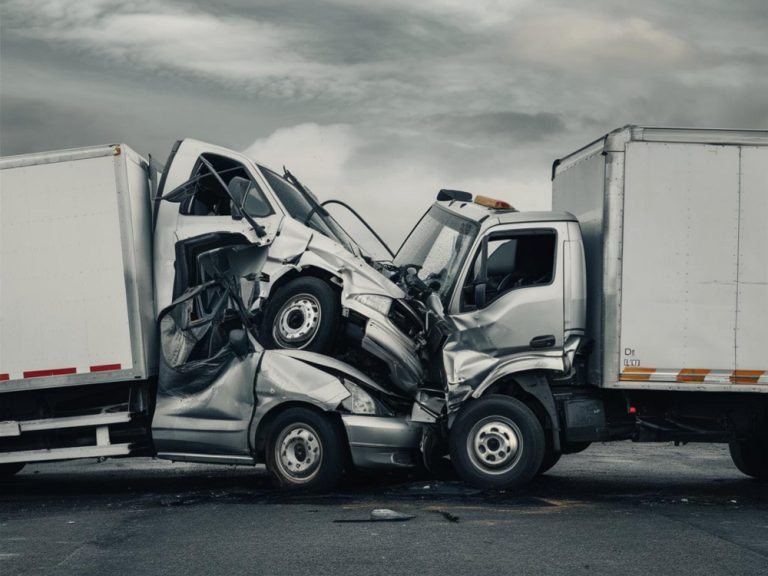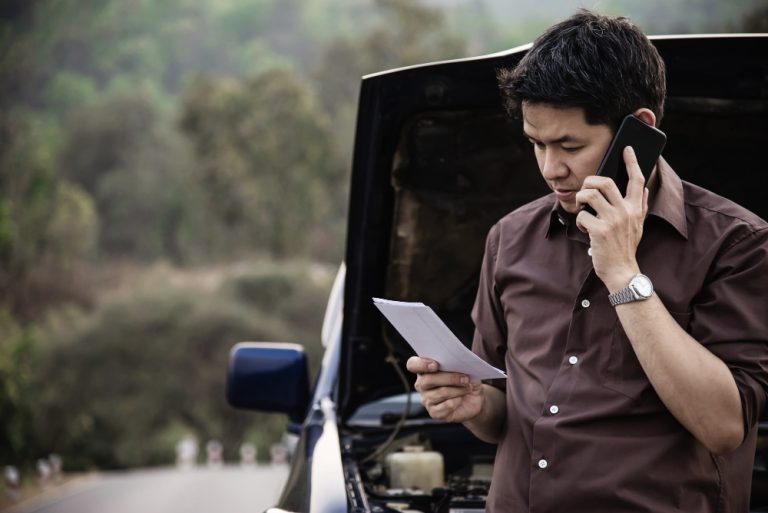Step 1: Check for Safety and Call 911
The first priority after any truck accident is safety. If you are conscious and able to move, get to a safe spot away from traffic, especially on highways such as I-90, I-290, or I-55, where secondary collisions are common. Even if injuries seem minor, always call 911.
Emergency responders will provide medical assistance, secure the scene, and create an official police report that later becomes vital evidence. That report, known as the Illinois Traffic Crash Report, is often the foundation of your case. We use it to verify times, weather, witnesses, and officer observations, all of which support your claim.
If you are unsure what details matter most in that report, we explain it in detail in The Truck Accident Claim Process.
Step 2: Gather as Much Evidence as Possible
Truck accident scenes change quickly as tow trucks arrive, debris is cleared, and witnesses leave. That is why we tell every client that if it is safe, they should document everything. Take photos or videos of the truck, including company name, DOT number, and license plate, all vehicles involved, road conditions, skid marks, debris, traffic lights, intersections, signs, and visible injuries.
Also, try to get contact information from witnesses before police clear the area. These statements often make a major difference later, especially when a trucking company tries to shift blame. Once we are hired, we immediately send preservation letters to secure black box data, driver logs, and dashcam footage. You can read more about that process in What Does a Truck Accident Lawyer Do.
Step 3: Get Medical Attention Even If You Feel Fine
After a truck accident, go to the hospital immediately. In many cases, victims refuse medical care at the scene because they feel fine, only to develop serious issues days later such as internal bleeding, back injuries, or brain trauma. Getting checked right away protects your health and creates medical documentation that directly connects your injuries to the crash.
At this stage, save every hospital or urgent care record, ambulance bill, prescription or therapy receipt, and follow-up summary. These records allow us to calculate medical damages when pursuing compensation later. We explain this process in How Is Compensation Determined After a Semi-Truck Wreck.
Step 4: Do Not Talk to Insurance Companies Yet
This is where many victims unintentionally harm their case. Shortly after an accident, an insurance adjuster representing the trucking company will likely call. They may sound sympathetic and ask for a statement or confirmation of details. We tell every client the same thing: you are not legally required to speak to the other insurer, and you should not until you have talked to a lawyer.
Everything you say can be used to minimize your claim. Adjusters are trained to get you to admit partial fault or accept a quick settlement before the full extent of your injuries is known. Once we represent you, we take over all insurer communication so you can focus on recovery while we handle every call, email, and negotiation. To understand what happens behind those calls, see What Does a Truck Accident Lawyer Do.

Step 5: Keep All Documents Organized
We encourage our clients to maintain a folder, digital or physical, for every document related to the accident. This includes police reports, photos, videos, insurance correspondence, medical bills, car repair invoices, and employment records showing missed work. When we begin building your claim, these documents save time and help calculate damages such as lost wages and property loss.
We also advise clients to keep a simple journal of pain, stress, and limitations in daily life. These personal notes are powerful evidence for non-economic damages when negotiating settlements.
Step 6: Contact a Chicago Truck Accident Lawyer Early
The sooner we become involved, the stronger your case becomes. Trucking companies are legally allowed to begin their own investigations immediately, often sending private investigators to the scene or retrieving black box data before victims even leave the hospital. Once retained, we send legal preservation notices, obtain police and DOT reports, request ELD data, identify all potentially liable parties, and start negotiating with insurers based on evidence.
Step 7: Understand the Timeline and Laws That Affect Your Case
Illinois law gives you two years from the date of the accident to file a personal injury lawsuit under 735 ILCS 5/13-202. That may seem like plenty of time, but truck accident cases often require months of investigation and evidence gathering. We have seen cases where victims waited too long, losing critical evidence such as dashcam footage or driver logs, or even missing the filing deadline entirely.
If your case involves a government vehicle or city truck, the timeline may be even shorter, requiring a notice of claim within months. That is why we always advise taking action immediately. Even a few days can make a difference.
Step 8: Document All Financial and Emotional Losses
Your truck accident claim should reflect the full impact of the crash on your life. When we build a case, we calculate lost wages and future earning capacity, medical expenses, pain and suffering, emotional distress, and, for spouses, loss of consortium. In wrongful death cases, we also pursue compensation for funeral costs, loss of support, and companionship damages. We explain these categories further in How Is Compensation Determined After a Semi-Truck Wreck.
Step 9: Know Your Rights Under Illinois Law
Illinois follows a modified comparative negligence system under 735 ILCS 5/2-1116. You can recover damages as long as you are less than 50 percent at fault. For example, if the truck driver was speeding and you were slightly over the limit as well, you may still recover compensation reduced by your percentage of fault. However, if you are found 50 percent or more at fault, you cannot recover damages.
This rule often becomes a major issue during insurance disputes. That is why we focus on building clear, evidence-based cases that prove the truck driver or company bears the majority of responsibility. For more details on liability, see Who Is Liable in a Truck Accident.
Step 10: Focus on Recovery While We Handle the Rest
The aftermath of a truck accident is painful and chaotic. Between medical treatments, physical therapy, and financial strain, handling legal issues can feel overwhelming. That is where we step in. Our clients know they can contact us anytime. We keep them updated, explain every step clearly, and fight to secure the maximum possible compensation.
If you are unsure whether you have a valid claim, remember this: it costs nothing to ask, but waiting could cost you your entire case. You can start by reading our full overview here Expert Truck Accident Lawyers in Chicago Fight for Your Rights.
Key Takeaways
- Always call 911 and ensure safety first after a truck accident.
- Document evidence at the scene and get immediate medical care.
- Avoid speaking with insurance companies until you have legal representation.
- Organize all records and contact a Chicago truck accident lawyer early.
- Illinois law gives two years to file a personal injury claim under 735 ILCS 5/13-202.
- Our team handles everything from investigation to trial, allowing you to focus on recovery.




